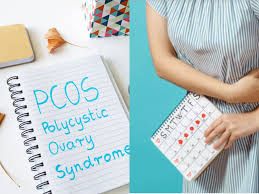Understanding PCOS and its Management
Polycystic ovary syndrome (PCOS) is a common hormonal disorder that affects women of reproductive age. It is characterized by a combination of symptoms related to hormonal imbalances, ovarian dysfunction, and metabolic issues. PCOS can lead to irregular menstrual cycles, difficulties with fertility, and various physical and emotional symptoms. Understanding PCOS and its management is crucial for improving quality of life and addressing potential long-term health risks.

Causes and Symptoms:
The exact cause of PCOS is not fully understood, but it is believed to involve both genetic and environmental factors. Insulin resistance, which leads to elevated insulin levels, is a common feature in many women with PCOS. This can trigger increased androgen (male hormone) production from the ovaries, leading to hormonal imbalances. The symptoms of PCOS can vary from woman to woman, but some common signs include:
· Irregular menstrual cycles: Women with PCOS may experience infrequent, prolonged, or absent menstrual periods.
· Hyperandrogenism: Elevated androgen levels can lead to physical symptoms such as acne, excessive facial and body hair growth (hirsutism), and male-pattern baldness.
· Polycystic ovaries: The ovaries may contain numerous small cysts, which are actually immature follicles that have not released eggs during the menstrual cycle.
· Weight gain: Many women with PCOS struggle with weight gain and find it difficult to lose weight.
· Insulin resistance and metabolic issues: PCOS is associated with an increased risk of developing type 2 diabetes, high blood pressure, and abnormal lipid profiles.
Management
The management of PCOS involves a multidisciplinary approach and focuses on addressing its symptoms, improving fertility (if desired), and reducing long-term health risks. Here are some key aspects of PCOS management:
· Lifestyle Modifications: Adopting healthy lifestyle changes can significantly improve PCOS symptoms and overall well-being. This includes maintaining a balanced diet, regular exercise, and managing stress levels.
· Medications: Hormonal contraceptives, such as birth control pills, can regulate menstrual cycles and control androgen levels, improving symptoms like acne and hirsutism.
· Management of Menstrual Irregularities: For women experiencing irregular or absent menstrual cycles, a combination of hormonal therapies and lifestyle changes can help restore regular menstruation.
· Managing Metabolic Risks: Regular health check-ups are essential to monitor parameters such as blood pressure, blood sugar levels, and lipid profiles. Lifestyle changes and medications can help in managing these risks.
· Psychological Support: PCOS can be emotionally challenging, especially for women struggling with infertility or coping with visible symptoms like hirsutism. Psychological support and counseling can help manage the emotional impact of PCOS.
PCOS is a complex hormonal disorder that requires careful management. A combination of lifestyle modifications, medications, and fertility treatments (if desired) can help women with PCOS lead fulfilling lives while reducing potential long-term health risks. Early diagnosis and proactive management are key to improving outcomes and promoting overall well-being for women living with PCOS.
